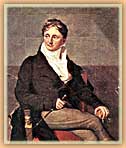 |

In western Europe philhellenism took the form of committees which undertook the promotion and support of the struggle of the Greek revolutionaries. The first movements appeared in Germany and in German-speaking regions of Switzerland.
The initiative came from people of letters, people sensitive to liberal ideas and admirers of Greek classical Antiquity.
In August 1821 the philhellenic committee of Stuttgart was founded and the
foundation of such committees in many German cities followed.
In autumn of the same year the committees of Switzerland, first Zurich, then Lausanne and Geneva were organized. All these movements aimed initially to provide humanitarian aid and support to the civilians, especially after the news of the atrocities and slaughter wrought by the Ottomans in Constantinople, Smyrna and later Chios. Apart form humanitarian aid,
for which many Christian organizations were set up, the main concern of the committees was supplying provisions, propagandistic material and also the transport of veteran European volunteers to the rebellious regions.
At the same time, there was much concern with educational support in the form of scholarships for studies in French and English educational institutes but also of provision of
educational materials to the affected regions.
The superior number of volunteers from German-speaking regions, especially during the first years of the uprising, reflects the strength of the philhellenic movement in these regions. A more active role was played by the British and French philhellenes
after the second and third years of the struggle, following the change of foreign policy of their respective countries.
Certainly, the supporters of Korais in Paris tried to take philhellenic initiatives from
quite early on. But only after 1823 did this action acquire a substantial character with the concentration of a
significant amount of money; at the same time the philhellenic committee of Marseille began.
The Swiss banker Eynard, a friend of Kapodistrias and a leader in the creation of the committees of Paris and Geneva, contributed considerably to the organization of the philhellenic movement in France and Switzerland. In particular, the Charitable Society for the support of the Greeks in Paris became the centre of coordination for all European committees. In Great Britain, the Philhellenic Committee of London was founded in 1823, with which the political philosopher Jeremy Bentham was in contact.
This committee played an important role in the relations between Greek revolutionaries and official British agents, but mainly on the matters that involved the granting of foreign loans.
|
 |